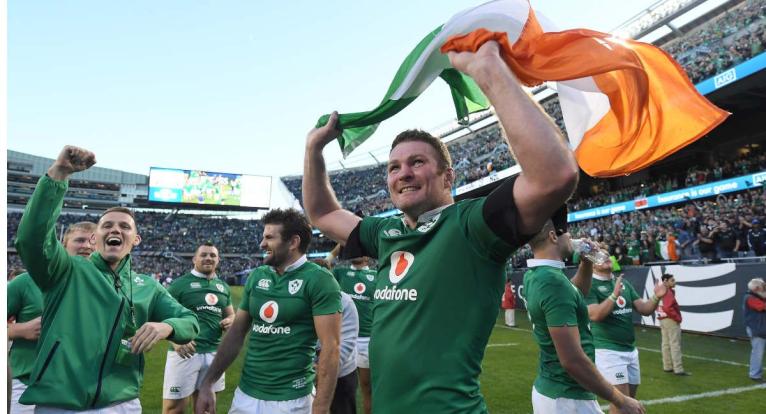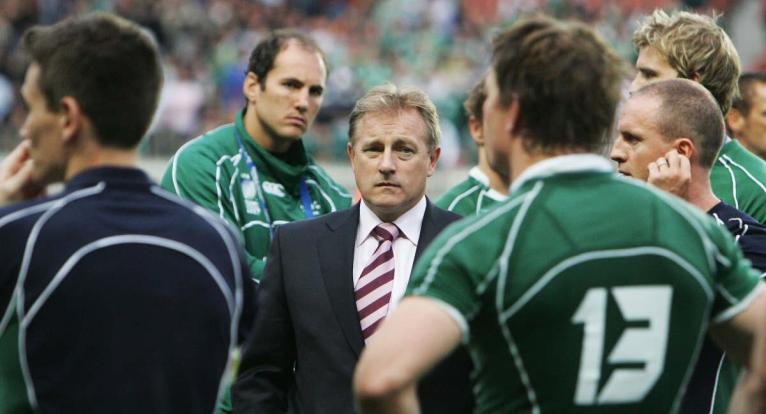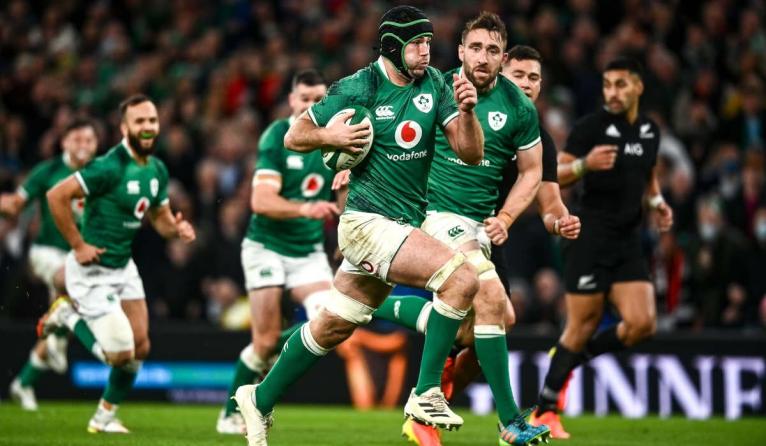It was the morning after the night before. The first flight out of O’Hare left at 6am making it an early start. For others, dressed in leprechaun hats, staggering around downtown Chicago, it was a late finish. “You Irish sure know how to party,” my taxi man said, as we glanced at pavements packed with people dressed in green. “Let’s hope by dawn we get our streets back, hey!”
This was November 2016 – the wee hours after Ireland’s first-ever win over the All Blacks. Driving along Clark Street in downtown Chicago felt like Dublin’s O’Connell Street on New Year’s Eve, everyone in celebratory mood. Perhaps it was the lack of sleep, perhaps it was the lack of perspective but you swore you were an onlooker at a World Cup triumph rather than the aftermath of a November international.
Fast forward two years. Another November win over the All Blacks, another Irish party. Joe Schmidt told a story that week about a couple he’d met back at the team hotel who had stayed in their stadium seats for two hours after the final whistle to savour every moment.
That was where Ireland were back then, overexcited not just by what they had but the promise of what lay ahead.

Few predicted how quickly it would all turn sour.
With this in mind, it was fascinating to stand back and observe the scenes and listen to the sounds of Dublin on Saturday. The roar after 78 minutes when Tadhg Beirne won a turnover penalty was louder than anything we’ve heard since 2018, a cheer that didn’t stop for a good 10 minutes, each side undergoing a lap of honour.
Dublin was buzzing on Saturday but not the way it was in 2018 and certainly not the way Chicago hopped on that November night in 2016. It was as if we’ve all received a vaccine to stop us catching the hype.
Even those with the darkest hearts must have been moved by what they saw, people being happy again, being fans again; being outside their homes again. Sure, it helped their team had won, but this wasn’t so much a celebration of an Irish victory, more a reaction to being free to do the things we once took for granted.
Dublin was buzzing on Saturday but not the way it was in 2018 and certainly not the way Chicago hopped on that November night in 2016. It was as if we’ve all received a vaccine to stop us catching the hype.
“Yeah, we are a good side, but we are not as good as people are saying,” said Jack Conan afterwards. Hugo Keenan, the Ireland full-back, was equally circumspect. “This is only the beginning,” he said. “There’s no silverware, we haven’t won anything.”
Fast forward to 2015. Two Six Nations titles had been acquired back to back. Ireland was a land of hype and glory. Argentina punctured that balloon on a drab Sunday in Cardiff.
Come 2019, people genuinely assumed Ireland might win the World Cup. In case you need reminding, Ireland have never even reached a World Cup semi-final.

So, the giddiness isn’t here now like before. Instead, self-awareness has become a national trait. For all the things Ireland did well on Saturday, they were still one missed tackle away from falling 27-26 behind in the 73rd minute.
That is why it was heartening to hear Johnny Sexton and Conan remind us of their shortcomings, Conan referencing the 70 per cent possession Ireland enjoyed in the first half and the failure to capitalise on that. “How many points did we leave behind us?” the No8 asked.
The answer is a lot. Yet by squandering points, they made one.
Ireland, in the past, have often been guilty of collective self-pity. You only have to think to the endless references to their injury list ahead of the 2015 World Cup quarter-final against Argentina or the closeness of David Humphreys’ late drop-goal attempt against Australia in 2003 to appreciate this.
Tactically we saw a marriage of two philosophies, the Schmidt theory and the Farrell one. The former was obsessed with the breakdown, with detail, with his team being accurate; the latter is from the opposing side of the debating chamber. “Heads-up rugby,” has been his mantra.
Saturday was different. They regrouped at half-time and produced their best moments of the game after it, Sexton and head coach Andy Farrell referencing the mental training they’ve undergone since Gary Keegan was added to the coaching ticket as a factor in the win.
This game wasn’t just decided in the head, though.
Tactically we saw a marriage of two philosophies, the Schmidt theory and the Farrell one. The former was obsessed with the breakdown, with detail, with his team being accurate; the latter is from the opposing side of the debating chamber. “Heads-up rugby,” has been his mantra.
Yet it was never thoroughly explained and, until the win over England in March, it had never been visible on the pitch. Questions started to be asked. Defeats by France (twice), England (twice) and Wales added to the noise. A year ago, when Ireland were lucky to beat Georgia, the dissent was deafening.

Now the critics are silent. It’s one thing talking a good game, another producing one. Ireland have. England, World Cup finalists, have been scalped; now New Zealand. It is seven wins on the trot for Farrell’s Ireland. He, and his team, have stepped out of Schmidt’s shadow.
Hear the names Kelleher, Porter and Furlong and you initially think of an accountancy firm; instead they are the most gifted front-row combo Ireland has ever had, players who can play the piano as well as push it.
The effect of all this was visible on Saturday, three moments acting as a snapshot of the day. First, midway through the first half, Ireland had a try disallowed after Kelleher, Porter and Tadhg Furlong had all punched holes in the All Blacks defence with explosive carries.
Hear the names Kelleher, Porter and Furlong and you initially think of an accountancy firm; instead they are the most gifted front-row combo Ireland has ever had, players who can play the piano as well as push it.
Come the second half, Kelleher was getting the try his performance deserved, while after 74 minutes, Porter was sprinting across the turf to assist Keith Earls as the All Blacks made one late frantic charge for a result. When have Ireland last had a prop capable of doing something like that in the 74th minute?
We’ve certainly had our share of world-class flankers in the past but, even so, the potential of Doris is visible for everyone to see. Saturday was his graduation day, the moment he picked up and charged for the line being the one when everyone in the stadium knew precisely what ‘heads-up rugby’ meant.
“You play what you see,” said Farrell afterwards. In the past, Ireland players did what they were told. Now they have the freedom to make their own decisions while retaining the Schmidt lessons when they arrive at the breakdown. It’s a potent mix, good enough to see off New Zealand on Saturday, enough to justify their new status as fifth favourites for the 2023 World Cup.
“We’ve a long way to go,” warned Keenan. “We are just at the start.”
But they begin their journey with a first-class honours in perspective. That’s new for Irish rugby. It could be the making of them.


Comments
Join free and tell us what you really think!
Sign up for free